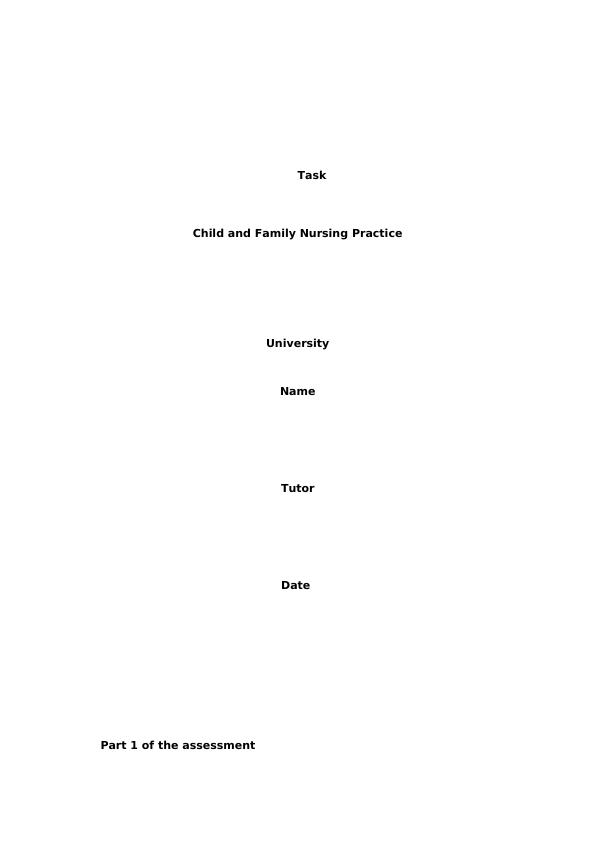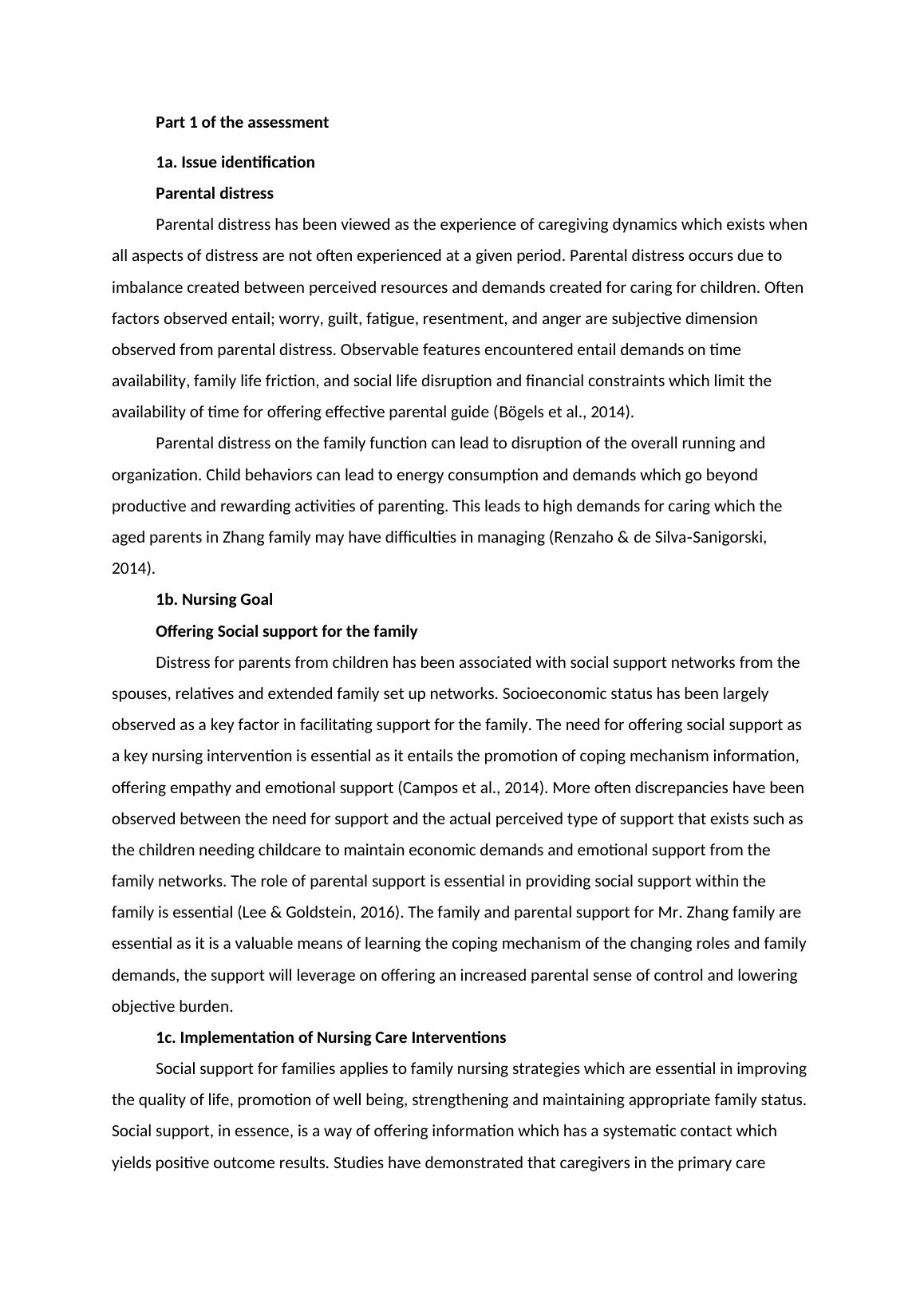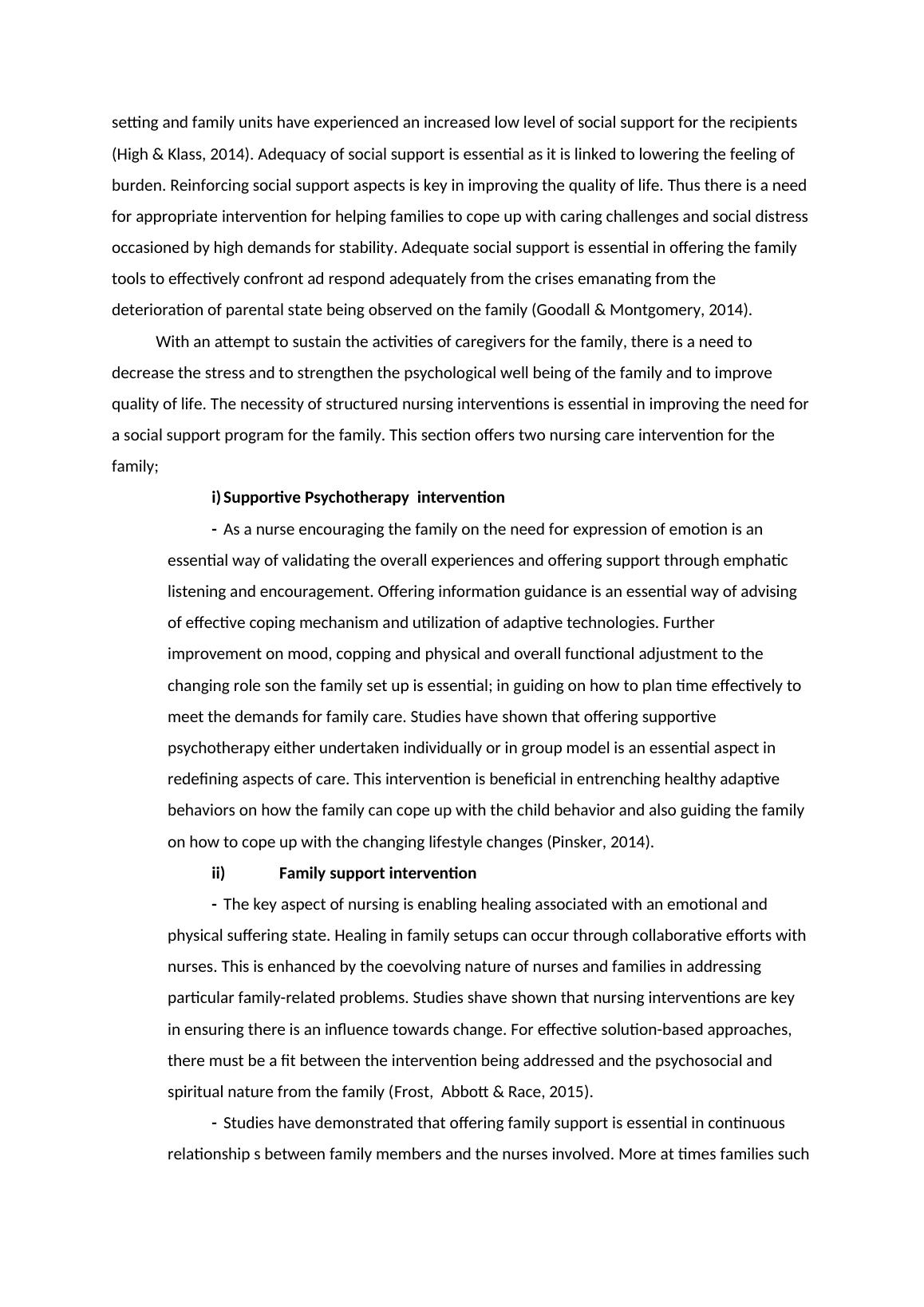Parental Distress and Social Support in Child and Family Nursing Practice
Added on 2022-12-19
7 Pages2303 Words99 Views
Task
Child and Family Nursing Practice
University
Name
Tutor
Date
Part 1 of the assessment
Child and Family Nursing Practice
University
Name
Tutor
Date
Part 1 of the assessment

1a. Issue identification
Parental distress
Parental distress has been viewed as the experience of caregiving dynamics
which exists when all aspects of distress are not often experienced at a given
period. Parental distress occurs due to imbalance created between perceived
resources and demands created for caring for children. Often factors observed
entail; worry, guilt, fatigue, resentment, and anger are subjective dimension
observed from parental distress. Observable features encountered entail
demands on time availability, family life friction, and social life disruption and
financial constraints which limit the availability of time for offering effective
parental guide (Bögels et al., 2014).
Parental distress on the family function can lead to disruption of the overall
running and organization. Child behaviors can lead to energy consumption and
demands which go beyond productive and rewarding activities of parenting. This
leads to high demands for caring which the aged parents in Zhang family may
have difficulties in managing (Renzaho & de Silva‐Sanigorski, 2014).
1b. Nursing Goal
Offering Social support for the family
Distress for parents from children has been associated with social support
networks from the spouses, relatives and extended family set up networks.
Socioeconomic status has been largely observed as a key factor in facilitating
support for the family. The need for offering social support as a key nursing
intervention is essential as it entails the promotion of coping mechanism
information, offering empathy and emotional support (Campos et al., 2014).
More often discrepancies have been observed between the need for support and
the actual perceived type of support that exists such as the children needing
childcare to maintain economic demands and emotional support from the family
networks. The role of parental support is essential in providing social support
within the family is essential (Lee & Goldstein, 2016). The family and parental
support for Mr. Zhang family are essential as it is a valuable means of learning
the coping mechanism of the changing roles and family demands, the support
will leverage on offering an increased parental sense of control and lowering
objective burden.
1c. Implementation of Nursing Care Interventions
Social support for families applies to family nursing strategies which are
essential in improving the quality of life, promotion of well being, strengthening
Parental distress
Parental distress has been viewed as the experience of caregiving dynamics
which exists when all aspects of distress are not often experienced at a given
period. Parental distress occurs due to imbalance created between perceived
resources and demands created for caring for children. Often factors observed
entail; worry, guilt, fatigue, resentment, and anger are subjective dimension
observed from parental distress. Observable features encountered entail
demands on time availability, family life friction, and social life disruption and
financial constraints which limit the availability of time for offering effective
parental guide (Bögels et al., 2014).
Parental distress on the family function can lead to disruption of the overall
running and organization. Child behaviors can lead to energy consumption and
demands which go beyond productive and rewarding activities of parenting. This
leads to high demands for caring which the aged parents in Zhang family may
have difficulties in managing (Renzaho & de Silva‐Sanigorski, 2014).
1b. Nursing Goal
Offering Social support for the family
Distress for parents from children has been associated with social support
networks from the spouses, relatives and extended family set up networks.
Socioeconomic status has been largely observed as a key factor in facilitating
support for the family. The need for offering social support as a key nursing
intervention is essential as it entails the promotion of coping mechanism
information, offering empathy and emotional support (Campos et al., 2014).
More often discrepancies have been observed between the need for support and
the actual perceived type of support that exists such as the children needing
childcare to maintain economic demands and emotional support from the family
networks. The role of parental support is essential in providing social support
within the family is essential (Lee & Goldstein, 2016). The family and parental
support for Mr. Zhang family are essential as it is a valuable means of learning
the coping mechanism of the changing roles and family demands, the support
will leverage on offering an increased parental sense of control and lowering
objective burden.
1c. Implementation of Nursing Care Interventions
Social support for families applies to family nursing strategies which are
essential in improving the quality of life, promotion of well being, strengthening

and maintaining appropriate family status. Social support, in essence, is a way of
offering information which has a systematic contact which yields positive
outcome results. Studies have demonstrated that caregivers in the primary care
setting and family units have experienced an increased low level of social
support for the recipients (High & Klass, 2014). Adequacy of social support is
essential as it is linked to lowering the feeling of burden. Reinforcing social
support aspects is key in improving the quality of life. Thus there is a need for
appropriate intervention for helping families to cope up with caring challenges
and social distress occasioned by high demands for stability. Adequate social
support is essential in offering the family tools to effectively confront ad respond
adequately from the crises emanating from the deterioration of parental state
being observed on the family (Goodall & Montgomery, 2014).
With an attempt to sustain the activities of caregivers for the family, there
is a need to decrease the stress and to strengthen the psychological well being
of the family and to improve quality of life. The necessity of structured nursing
interventions is essential in improving the need for a social support program for
the family. This section offers two nursing care intervention for the family;
i) Supportive Psychotherapy intervention
- As a nurse encouraging the family on the need for expression of
emotion is an essential way of validating the overall experiences and
offering support through emphatic listening and encouragement. Offering
information guidance is an essential way of advising of effective coping
mechanism and utilization of adaptive technologies. Further improvement
on mood, copping and physical and overall functional adjustment to the
changing role son the family set up is essential; in guiding on how to plan
time effectively to meet the demands for family care. Studies have shown
that offering supportive psychotherapy either undertaken individually or in
group model is an essential aspect in redefining aspects of care. This
intervention is beneficial in entrenching healthy adaptive behaviors on
how the family can cope up with the child behavior and also guiding the
family on how to cope up with the changing lifestyle changes (Pinsker,
2014).
ii) Family support intervention
- The key aspect of nursing is enabling healing associated with an
emotional and physical suffering state. Healing in family setups can occur
through collaborative efforts with nurses. This is enhanced by the
offering information which has a systematic contact which yields positive
outcome results. Studies have demonstrated that caregivers in the primary care
setting and family units have experienced an increased low level of social
support for the recipients (High & Klass, 2014). Adequacy of social support is
essential as it is linked to lowering the feeling of burden. Reinforcing social
support aspects is key in improving the quality of life. Thus there is a need for
appropriate intervention for helping families to cope up with caring challenges
and social distress occasioned by high demands for stability. Adequate social
support is essential in offering the family tools to effectively confront ad respond
adequately from the crises emanating from the deterioration of parental state
being observed on the family (Goodall & Montgomery, 2014).
With an attempt to sustain the activities of caregivers for the family, there
is a need to decrease the stress and to strengthen the psychological well being
of the family and to improve quality of life. The necessity of structured nursing
interventions is essential in improving the need for a social support program for
the family. This section offers two nursing care intervention for the family;
i) Supportive Psychotherapy intervention
- As a nurse encouraging the family on the need for expression of
emotion is an essential way of validating the overall experiences and
offering support through emphatic listening and encouragement. Offering
information guidance is an essential way of advising of effective coping
mechanism and utilization of adaptive technologies. Further improvement
on mood, copping and physical and overall functional adjustment to the
changing role son the family set up is essential; in guiding on how to plan
time effectively to meet the demands for family care. Studies have shown
that offering supportive psychotherapy either undertaken individually or in
group model is an essential aspect in redefining aspects of care. This
intervention is beneficial in entrenching healthy adaptive behaviors on
how the family can cope up with the child behavior and also guiding the
family on how to cope up with the changing lifestyle changes (Pinsker,
2014).
ii) Family support intervention
- The key aspect of nursing is enabling healing associated with an
emotional and physical suffering state. Healing in family setups can occur
through collaborative efforts with nurses. This is enhanced by the

End of preview
Want to access all the pages? Upload your documents or become a member.
Related Documents
Strategies for Supporting Children in Childcare Centerslg...
|7
|1549
|372
Child and Family Nursing Practice Case Study 2022lg...
|9
|2182
|21
Living with Dying in the Pediatric Intensive Care Unit: A Nursing Perspectivelg...
|8
|5894
|81
Palliative Care of Children: Importance, Benefits and Approacheslg...
|6
|1239
|452
Interprofessional Collaboration for Carelg...
|8
|2401
|56
2810NRS - Nursing Practice Assessmentlg...
|9
|2233
|176
